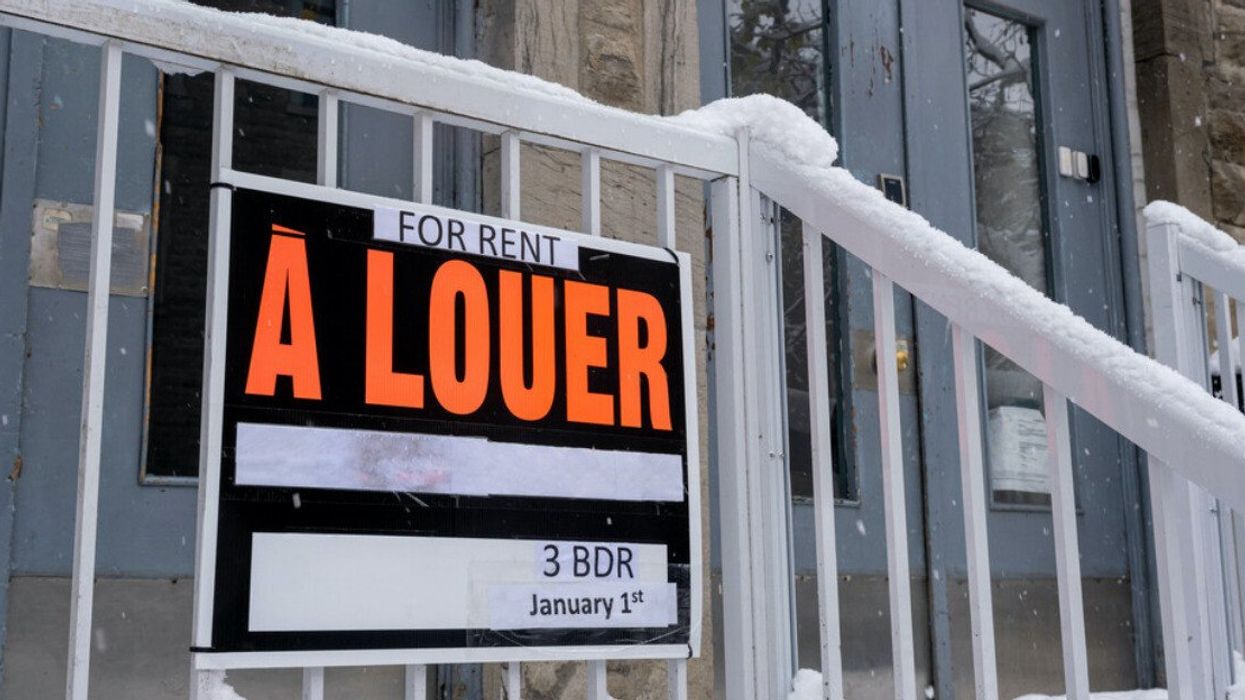Average Rent In Canada Just Hit An All-Time High — Here's The Outlook For 2024
Some cities are faring better than others.

A for rent sign hangs on a snowy Montreal stairwell.
Renters in Canada may have felt more of a financial squeeze last month as 2023 wrapped up with average rents hitting a new high.
According to the latest National Rent Report from Rentals.ca and Urbanation, December saw the average asking rent for all property types reach a record $2,178. That marks an 8.6% increase from the previous year, continuing an upward trend that has seen rents rise by 22% over the past two years, and translating to an additional $390 per month on average for Canadian tenants.
Traditional purpose-built rental apartments led the pack with a 12.8% increase in 2023, while the growth rates of condo and house rentals saw increases of 6.9% and 5.9%, respectively.
Rent rundown
Alberta experienced the fastest growth in rents for purpose-built and condominium apartments, recording a 15.6% annual increase. In contrast, British Columbia saw a slight year-over-year decrease, despite being the most expensive province for apartment rents.
In Quebec, cities like Montreal, Laval, and Québec City showed varied trends. Montreal's average rent for a one-bedroom unit increased by 10.2% year-over-year, finishing 21st out of 35 cities in December. The average one-bedroom rent was $1,741, a decrease of 3.6% month-over-month, while the average two-bedroom rent was $2,249, decreasing by 1.3% month-over-month but increasing by 8.5% year-over-year.

Laval's rental market saw increases among the highest in the country. It finished 25th out of 35 cities, with the average one-bedroom rent at $1,653, marking a 0.7% increase month-over-month and a substantial 16.2% increase year-over-year. The average two-bedroom rent was $1,999, which decreased by 2.8% month-over-month but increased by 3% year-over-year.
In Quebec City, which finished 30th out of 35 cities, the rental market maintained more stability. The average one-bedroom rent was $1,325, a slight 0.5% increase month-over-month and a 9.5% increase year-over-year. For two-bedroom units, the average rent was $1,677, decreasing by 3.8% month-over-month but increasing by 14.6% year-over-year.
Looking ahead
Increases have been attributed to factors like a surge in non-permanent residents, a resilient economy, and decreased home-buying activity. A more balanced trajectory is anticipated for 2024, with rent growth potentially converging towards the five-year average of around 5%.
"While rents are expected to continue rising in 2024, there should be less upward pressure on the market this year as demand increases at a somewhat slower speed and more supply is added," said Shaun Hildebrand, President of Urbanation.
The introduction of more apartments, and an expected rise in tenant turnover could potentially moderate rent growth.
- The Best Places to Live In Canada Were Ranked & A Quebec Town Made The Top 5 ›
- Loblaws Is Reducing Discounts On Expiring Foods & People Aren't Happy About It ›
- The Safest Cities In Canada Were Ranked & 5 Quebec Towns Made The Top 10 ›
- Canada's rent prices hit an all-time record high and Quebec is actually looking pretty good - MTL Blog ›
